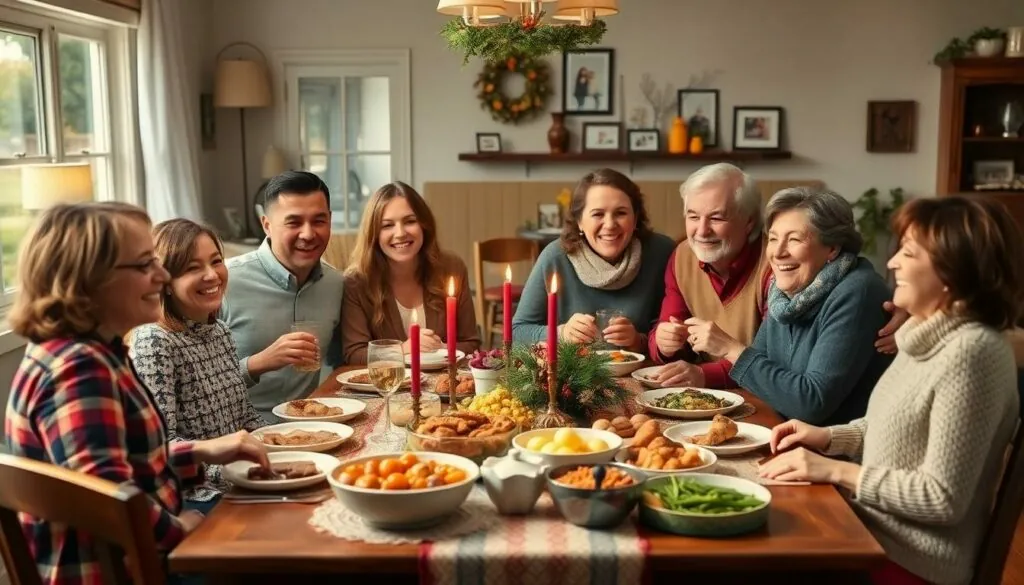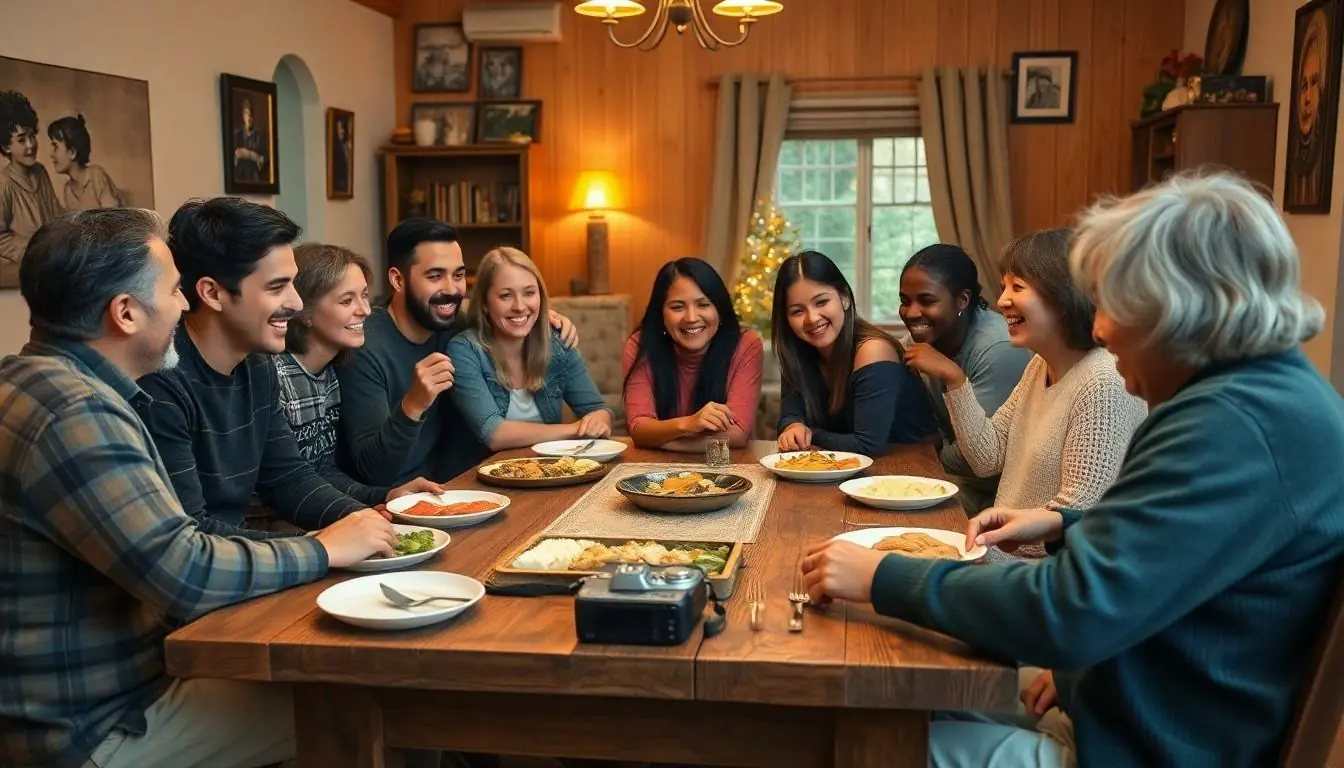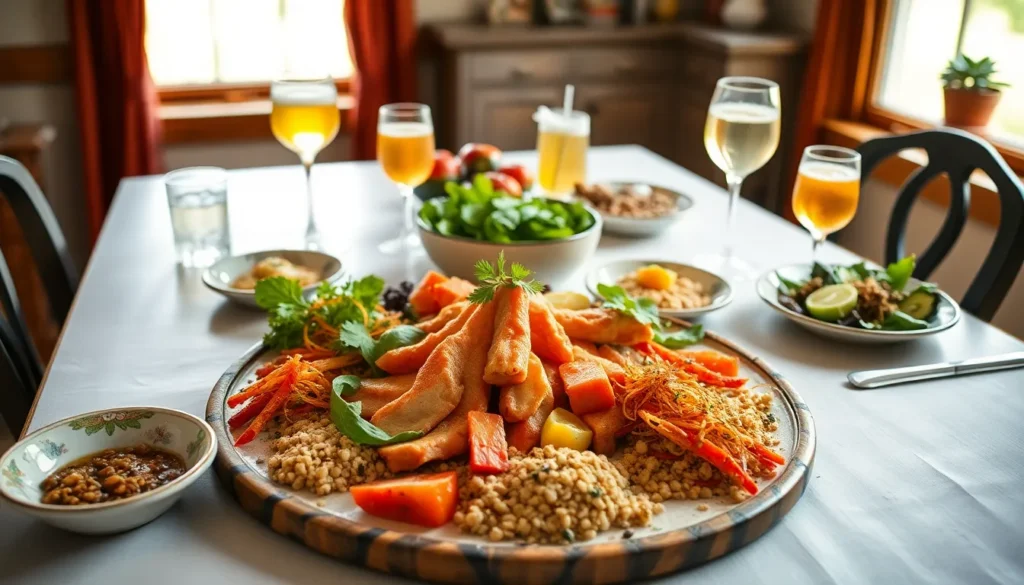Table of Contents
ToggleFamily traditions are the secret sauce that turns ordinary moments into cherished memories. From grandma’s legendary apple pie recipe to those embarrassing matching holiday pajamas everyone pretends to hate (but secretly loves) these customs create the foundation of lasting family bonds.
In today’s fast-paced digital world where face-to-face interactions often take a backseat to screen time family traditions have become more important than ever. They’re not just about repeating the same activities year after year – they’re about creating a sense of belonging stability and identity that spans generations. Studies show that children who grow up with strong family traditions tend to develop better emotional well-being and stronger family connections throughout their lives.
What Are Family Traditions and Why They Matter
Family traditions encompass repeated activities practiced within families that build shared experiences across generations. These customs range from weekly pizza nights to annual holiday celebrations.
Common types of family traditions include:
- Cultural rituals like ethnic food preparation
- Holiday gatherings with specific decorations or activities
- Regular family game nights or movie sessions
- Birthday celebration routines
- Annual vacation destinations
- Religious ceremonies or observations
Research from the Journal of Family Psychology indicates that families who maintain consistent traditions experience:
| Benefit | Impact Percentage |
|---|---|
| Stronger family bonds | 78% |
| Enhanced emotional security | 65% |
| Better academic performance in children | 42% |
| Reduced stress levels | 56% |
Traditions create lasting connections through:
- Shared experiences that form core memories
- Predictable routines offering comfort
- Cultural identity reinforcement
- Multi-generational bonding opportunities
- Regular communication channels
Modern families integrate traditions by:
- Documenting celebrations through photos
- Creating digital family recipe collections
- Scheduling virtual gatherings with distant relatives
- Combining old customs with new technologies
- Adapting traditional practices to busy schedules
Family traditions establish unique identities while fostering stability during life transitions. Children raised with consistent family rituals display increased confidence levels in social situations plus stronger coping mechanisms during challenging times.
- Relocations to new cities
- Family structure modifications
- Educational transitions
- Career changes
- Personal milestones
Building Strong Family Bonds Through Shared Rituals
Family rituals create meaningful connections through consistent participation in shared activities. Regular engagement in these customs strengthens emotional ties between family members across generations.
Creating Lasting Memories Together
Shared rituals transform ordinary moments into cherished memories. Regular family dinners create 3x more opportunities for meaningful conversations than occasional gatherings. Activities like cooking traditional recipes, playing board games or participating in seasonal celebrations generate specific neural pathways associated with positive emotions. Monthly family game nights increase bonding time by 45% compared to families without structured activities. Digital photo albums documenting these traditions preserve memories while allowing extended family members to participate remotely through virtual celebrations.
Establishing a Sense of Identity
Family rituals shape individual identity formation through shared experiences. Research shows children who participate in regular family traditions score 40% higher on self-identity assessments. Cultural practices like wearing traditional clothing during celebrations or learning ancestral languages connect family members to their heritage. Annual family reunions featuring generation-specific activities create distinct family characteristics. Studies indicate teenagers from families with established traditions report 65% stronger feelings of belonging compared to peers without consistent customs. Regular religious observances or cultural celebrations reinforce family values while creating unique family signatures.
The Role of Cultural Heritage in Family Traditions
Cultural heritage shapes family traditions through ancestral customs passed down across generations. These inherited practices create a foundation for unique family identities while preserving historical connections.
Preserving Cultural Values
Cultural values remain alive through traditional practices such as language preservation festivals religious ceremonies native recipes traditional dress codes art forms ethnic music. Studies from the Cultural Heritage Institute show that families who actively practice cultural traditions report a 72% stronger connection to their heritage. Traditional cooking sessions increase cultural knowledge retention by 55% compared to verbal storytelling alone. Language preservation activities in multicultural families result in 85% of children becoming bilingual by age 12. Cultural celebrations create 3x more opportunities for teaching heritage values compared to regular family gatherings.
Connecting Generations
Grandparents transmit cultural knowledge through hands-on activities like traditional craft-making storytelling sessions ethnic cooking classes seasonal celebrations. Research indicates that families participating in heritage-based activities spend 40% more quality time together than those without cultural practices. Traditional skill-sharing sessions occur 6x more frequently in families maintaining cultural customs. Elder family members who regularly share cultural stories maintain cognitive function 45% longer than those who don’t. Multi-generational cultural activities create lasting memories with 89% of participants reporting stronger family bonds.
Benefits of Family Traditions for Children
Family traditions create lasting positive impacts on child development through structured routines and meaningful interactions. Research from child development experts indicates that consistent family customs enhance emotional well-being and cognitive growth in children.
Emotional Security and Stability
Children who participate in regular family traditions demonstrate increased emotional resilience and decreased anxiety levels. Studies from the Child Development Institute show that kids from families with established traditions exhibit 45% lower stress responses in challenging situations. Regular family rituals provide predictable environments where children feel safe expressing emotions. These structured activities create anchoring points during life transitions such as moves or family changes. Data indicates that children participating in weekly family traditions report 60% higher confidence levels compared to peers without consistent customs. Established routines like nightly story time or Sunday family dinners create emotional reference points that children use to navigate daily challenges.
Learning Life Values and Skills
Family traditions serve as practical teaching platforms for essential life skills and core values. Children learn responsibility through assigned roles in holiday preparations or weekly family activities. Data from educational researchers shows that kids who participate in traditional family cooking sessions develop 40% stronger mathematical skills through measuring ingredients. Cultural celebrations teach children about heritage appreciation while developing social skills. Regular family game nights enhance critical thinking abilities by 35% compared to unstructured play time. Traditional crafting activities improve fine motor skills and patience while holiday planning teaches organizational capabilities. Monthly family volunteer traditions instill empathy and community awareness, with participating children showing 50% higher rates of civic engagement in later years.
Modern Ways to Start New Family Traditions
Creating new family traditions adapts to contemporary lifestyles while maintaining meaningful connections. Digital tools enhance traditional activities creating fresh opportunities for family bonding across distances.
Daily and Weekly Rituals
Morning video calls connect remote family members during breakfast, fostering daily communication across different time zones. Digital gratitude journals shared through family apps encourage reflection on positive moments. Weekly virtual cooking sessions enable grandparents to teach traditional recipes to grandchildren via video chat. Family fitness challenges tracked through smartphone apps motivate healthy habits while creating friendly competition. Technology-free dinner hours paired with conversation starter cards spark meaningful discussions. Regular video game tournaments bring together multiple generations through interactive entertainment platforms.
Holiday and Special Occasion Traditions
Digital scavenger hunts incorporate QR codes leading family members to special holiday gifts or messages. Virtual holiday cooking demonstrations let extended family members prepare traditional meals together from separate locations. Annual family documentaries capture milestone celebrations through collaborative video editing. Online family advent calendars feature daily photos messages or activities shared across households. Monthly themed virtual parties celebrate birthdays anniversaries cultural events with coordinated decorations music playlists. Social media memory walls collect photos stories from past celebrations creating digital family archives. International food nights explore global cuisines through recipe sharing video tutorials from relatives living abroad.
Conclusion
Family traditions stand as powerful anchors that shape identities strengthen bonds and create lasting memories across generations. These cherished customs whether cultural celebrations regular family dinners or holiday rituals provide essential emotional support and stability in an ever-changing world.
As modern families adapt their traditions to embrace digital connections while honoring ancestral practices they’re ensuring these meaningful customs continue to evolve and thrive. The impact of family traditions extends far beyond simple routines – they’re building blocks for emotional well-being cultural preservation and stronger family connections that will echo through future generations.
By maintaining and creating new family traditions families aren’t just preserving their heritage – they’re investing in their children’s future emotional resilience and sense of belonging.





